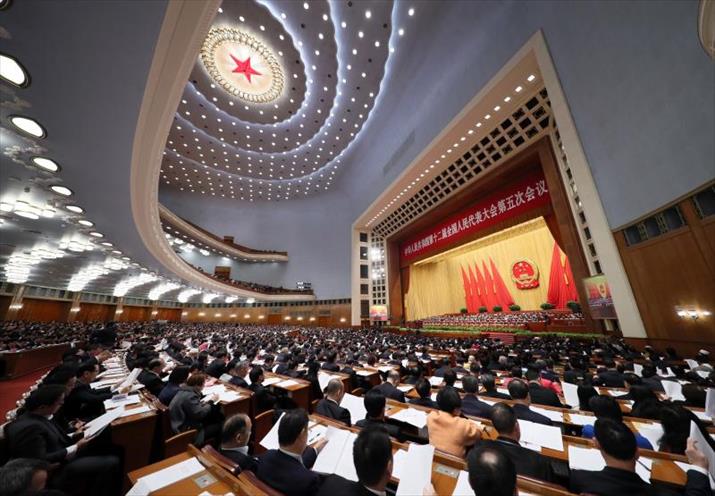|
||||||||||
| Home Nation World Business Opinion Lifestyle ChinAfrica Multimedia Columnists Documents Special Reports |
|
||||||||||
| Home Nation World Business Opinion Lifestyle ChinAfrica Multimedia Columnists Documents Special Reports |
| China |
| Confident Outlook |
| China's NPC and CPPCC sessions promote democracy in action and an economy that continues to drive global growth |
| By Ni Yanshuo | VOL. 9 April 2017 ·2017-03-30 |

Several days later, Pan reached Beijing to attend the Fifth Session of the 12th NPC. In her suitcase, she had a thick notebook containing all the information collected from the area she represents, and a motion of developing boarding schools in remote areas.
"These represent the hopes of the people in my hometown and I must make their voices heard by competent departments," she said. "This is my duty as an NPC deputy. I must speak for those I represent, here in Beijing."
Political gathering
Pan is one of the more than 5,000 NPC deputies and members of the National Committee of the Chinese People's Political Consultative Conference (CPPCC) who gathered in Beijing to review the government's work in the previous year and discuss future development. NPC deputies and CPPCC members usually serve a term of five years.
This is China's lianghui, or Two Sessions, namely, the annual sessions of the NPC, China's top legislature, and the CPPCC National Committee, China's top political advisory body. This year, nearly 3,000 deputies to the NPC and more than 2,000 members of the CPPCC National Committee from different parts of China gathered in Beijing with motions and proposals in their hands from March 3 to 15.
"This is the Chinese way of democracy where the voices from even the lowest level of communities can be heard by policy makers, and problems can be solved timeously," said Pan. In 2015, Pan submitted her motion of improving pre-school education in remote mountainous areas. Soon, a program of "one village, one kindergarten" was launched in her hometown of Liangshan Yi Autonomous Prefecture. She also suggested increasing railway transportation to places inhabited by ethnic minorities. Late last year, three more trains were added to Ganluo County of Liangshan Yi Autonomous Prefecture.
"The annual lianghui is the place not only for policy makers to learn more about local voices, but also for the outside world to know more about China," said Wang Yiwei, Senior Researcher at the Chongyang Institute for Financial Studies of the Beijing-based Renmin University of China. "This year, the world can see confidence in China's development from lianghui."
Economic stability
The confidence comes from China's steady medium-high economic growth, Wang noted. According to the Report on the Work of the Government delivered by Chinese Premier Li Keqiang at the opening of the NPC session on March 5, China's GDP growth in 2017 is projected to be around 6.5 percent.
"A projected economic growth rate of approximately 6.5 percent is good news for Africa," Garth Shelton, Associate Professor of the Department of International Relations, University of the Witwatersrand, Johannesburg, South Africa, told ChinAfrica. "And strong growth in China will translate into increased demand for African commodities."
According to Shelton, China's continued commitment to opening up and international trade will be welcomed in Africa. The growth in China-Africa trade over the last 20 years has been a key factor in Africa's economic development.
China's economic confidence also improves global confidence. Statistics show that in 2016, China's economic growth contributed more than 30 percent to world economic growth. "China's opening door will not close again," said Chinese President Xi Jinping at a discussion of the NPC Shanghai delegation, of which he is a member, on March 5. Xi added that China will stick to an all-round opening-up policy, and continue to liberalize and facilitate trade and investment.
In 2016 alone, China made $170.1 billion outbound direct investment and Chinese tourists made more than 120 million overseas visits. Africa is among the main destinations of China's investment and tourists.
"I hope the outcome of the Two Sessions will promote Chinese investment in Africa and assistance with the building of roads, railway lines and related infrastructure," Shelton said. "China's assistance in this regard provides the foundation for Africa's industrialization and modernization."
(With additional reporting from Lu Anqi in Johannesburg)
| 2Next |
| About Us | Contact Us | Advertise with Us | Subscribe |
| Copyright Beijing Review All rights reserved 京ICP备08005356号-5 京公网安备110102005860号 |